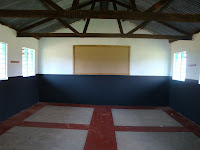The weight issue is a constant talking point as important as my marital status. It is the first thing pointed out after returning to the village from a trip: day, leisure or weekend. In the central region of Uganda, expanding in size is prestigious. However, I’m unsure the implication in the NE, the region experiencing famine. The Itesot people are thin and toned, known for digging in the garden through the night during the full moon. If that is what it takes to get a flat stomach, no thanks. Therefore, when the issue of weight came up in a recent conversation with Nathan, I was not surprised.
“What is your exercise program?” Nathan asks slyly to find out whether I continued running over the holiday. The truth is that I did not. Between hosting volunteers and nursing Moose back to health (now healthy and with a new family, for the best), I was exhausted. The last thing I wanted to do was run.
“Well, not much over break. I only run when I feel like someone is counting on me to show up. That’s you. Otherwise, I go through the same routine at night in my house: jump rope, sit-ups, push-ups, crunches and finally dips. Then I repeat. It isn’t overly strenuous but it gets a good sweat going.”
Nathan’s eyes squint in disbelief. “Hmm. But you are not like me. You are larger. How is it possible if you do all that exercise?”
“We are different people from different cultures. Everyone has a different body type. This is my body type and it is larger than yours is. In comparison, I am larger, but still healthy. The healthiest I’ve ever been,” I explain as calmly as possible, ignoring the implied fat jab.
“But nearly everyone here is thin. Why do white people differ in size?”
“As I said before, people have different body types. Some people are naturally large. Even if you consider them fat, they can still be healthy. Fat isn’t always a bad thing.”
At this comment, he sucks his teeth and lowers his head in thought. “Then why do you exercise? If fat isn’t bad, why not let yourself expand? And dislike it when people point out that you are getting fat?”
“It is important to me, as part of my culture, to maintain a healthy physique. My people hold fitness in highest esteem. It would be harder to find a partner if I let myself go. Sad fact but true. However, I refuse to starve myself for abdominal muscles and I’m too poor to hire a personal trainer.” I decide to leave out the complicated explanation of the media’s focus on thinness and the struggle many people face with eating disorders in American culture.
“What do you mean? “Your people?”
“Are all Itesot people the same? No. There are Protestants, Catholics, farmers, teachers, shopkeepers, polygamists, etc.”
“And your people? Who are they? Catholics?” Nathan asks. I tell the people of my village that I was raised Catholic. I eases the explanation of religion.
“Not exactly. We believe in style, good food, travel and music. To fit into the best clothes, some people pay a person to make them workout.”
“People pay someone to tell them how to exercise?”
“Yes, and to push them to the point of collapse. I don’t think that is an appropriate way to spend money, especially after living here,” I explain, realizing my spending habits may never be the same.
“Why don’t they go dig in the garden? That is how we maintain our bodies.”
“People at home don’t keep fields like you do here. We shop at markets and grocery stores. We exercise at fitness clubs and gymnasiums.”
“And you pay for all that?”
“Yes.”
“Too expensive. I’ll never understand Americans. I rather stay here. I can see my abdominals in the village for no money.”
“Well, now you’re just boasting,” I mock as we both laugh, holding our stomachs.



2 comments:
i love this. and i love you!
Adam!!! Just found your blog via the UW-Madison School of Education Online News. I'm so glad you decided to do the Peace Corps and look forward to catching up with you upon your return. I'm currently in Maryland as an assistant professor in Curriculum and Instruction but am thinking of returning to Madison to become a community-based counselor. So glad to see your mug again and read your stories. Take care out there!!
Connie (of the PDS partnership way back when)
Post a Comment